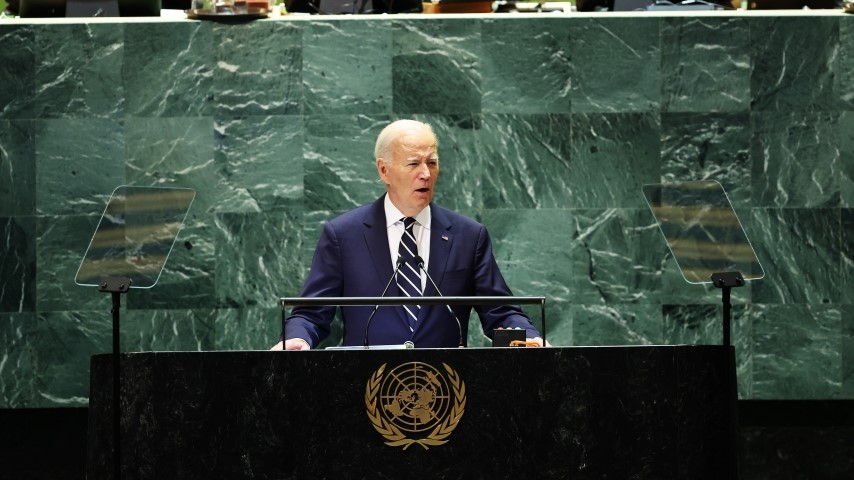Biden’s United Nations Good-Bye: Unfinished Business and a To-Do List
Photo by Michael M. Santiago/Getty Images
President Joe Biden made his unofficial exit from the world stage on Tuesday, delivering his fourth and final address to the United Nations General Assembly. In his speech, Biden reflected on the current global chaos. It doubled as a warning and an acknowledgement: the world’s catastrophes are as profound as ever, but this U.S. president would be leaving most unresolved. It’s now the job of others to navigate out of this deepening disorder.
If it was a farewell address, it was a wistful one. Maybe that makes sense given the world Biden himself described: Russia’s ongoing invasion of Ukraine; Israel’s war in Gaza that is now engulfing the entire Middle East; the rise of violence against Palestinians in the West Bank; famine and war in Sudan; democracies at risk; the still-unmet crises of climate change and artificial intelligence.
- Bernie Sanders and Some Democrats Get Ready to Lick Elon’s Boots and Practice the Politics of the Past
- Nancy Mace Is an Irredeemable Garbage Person Who Loves Bullying Vulnerable People and Yet the Media Still Believes Her
- NBC Seems to Suggest a Children's Video Game is to Blame for UnitedHealthcare CEO's Killing
All of this is unfolding as America’s own role in the world is uncertain. At Biden’s first United Nations address in 2021, he promised to use American power to work with allies and partners to solve global challenges, to emphasize diplomacy over military might, and to protect democracy against the forces of authoritarianism. Biden’s record has been tested on all of those. But a president’s unfulfilled vision for America is one thing. If Donald Trump returns as president, he may dismantle it entirely.
“I know many look at the world today and see difficulties and react with despair, but I do not and I won’t,” Biden said. “As leaders we don’t have the luxury.”
Biden started off by looking at the past, noting the other global challenges he’d witnessed, from the Cold War, to the Vietnam war, to apartheid in South Africa. He used those examples to illustrate how citizens and leaders could overcome current challenges. And he did reflect on his own legacy, most notably recounting his decision to withdraw from Afghanistan. “It was a hard decision, but the right decision,” he said. He peppered in some other accomplishments throughout the speech – support for Ukraine, the strengthening of NATO, the building of alliances like the Quad in the Indo-Pacific, and the U.S.’s support for global food aid and the MPox vaccine.
But for a leader who cares deeply about his foreign policy record, Biden spent a lot of time talking about all the unfinished business under his watch – an uncertain future for Ukraine aid, an unattainable ceasefire between Israel-Hamas and an inability to stop Israel from acting with impunity and widening its war against Hezbollah in Lebanon. Biden denounced the October 7 Hamas attacks and the humanitarian crisis in Gaza, saying Palestinians “didn’t ask for this war that Hamas started.” Now is the time for a ceasefire, he said, to bring the hostages home and ease the suffering in Gaza. On Israel’s escalating attacks in Lebanon, Biden said a “full scale war is not in anyone’s interest,” and that diplomatic solutions were still possible, though he did not elaborate what those might be.
Biden also spoke about atrocities and famine in Sudan, probably the highest level treatment the U.S. has given to the war to date. Biden said the world needed to stop arming the generals – though he did not name names – and called on those warring generals to stop blocking aid to the Sudanese people. “End the war,” Biden said. Together, on Ukraine, on Gaza, on Sudan, it felt a bit like a wishful presidential bucket list – all the things Biden would do, or maybe thinks he could have achieved, if he only had more time.
Biden also talked about some of the looming challenges of the future, most notably using a good portion of his speech to address artificial intelligence. AI will “change our ways of life, our ways of work, our ways of war,” Biden said. He asked how leaders of the international community should regulate AI, and warned against giving “dictators more powerful shackles” on the human spirit. “There may well be no greater test of our leadership than how we deal with AI,” he said.
This was the coda of Biden’s UN speech, a kind of advice column from the elder statesmen. He reflected on his decision not to seek re-election, which he made clear that he saw as part of his legacy. “I made the preservation of democracy the central cause of my presidency,” Biden said. “I faced a decision whether to seek a second term as president. It was a difficult decision. There’s so much more I want to get done, but as much as I love the job, I love my country more.”
“My fellow leaders, let us never forget some things are more important than staying in power — it’s your people,” Biden added, to some of the loudest applause of his address. Biden’s legacy on defending democracy abroad is a deeply flawed one – the moral clarity of Ukraine superseded by the U.S.’s complicity in Israel’s war. But Biden placed himself, and his decision to withdraw from the 2024 presidential race, as squarely within this struggle between democracy versus authoritarianism. It revealed, more than the actual foreign policy decisions he made, how Biden really sees his legacy in America, and in the world – or at least what he wants it to be. So much will depend on who is standing on the same podium next year at the United Nations, and the global tumult unfolding around them when they do.